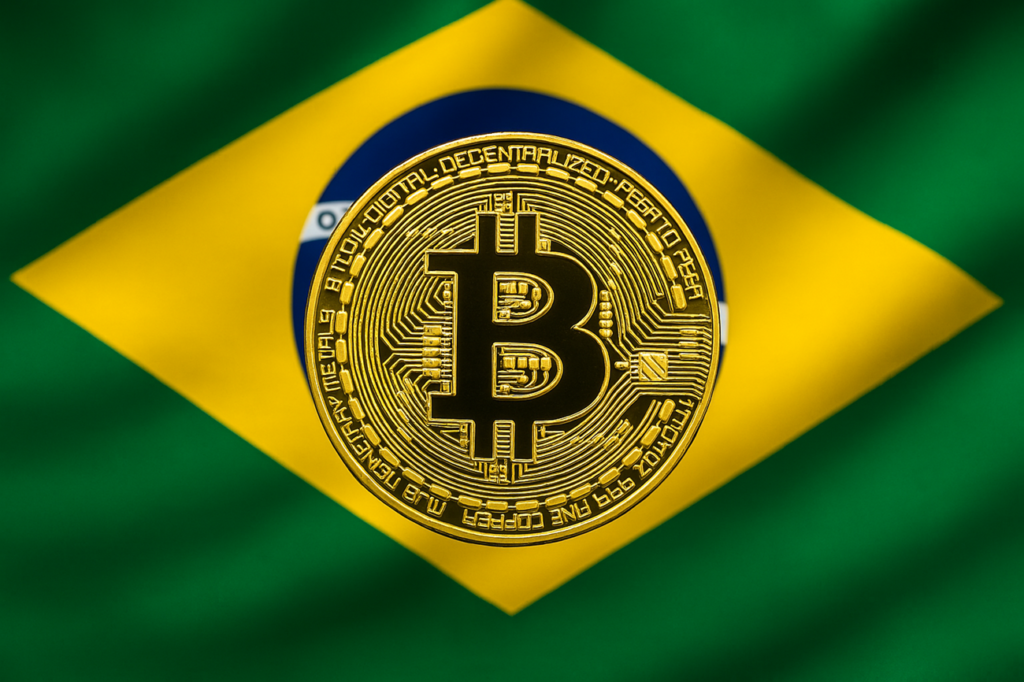Content that’s trustworthy, comprehensive, and meticulously reviewed by leading industry experts is what you’ve come to expect from our platform. We present a unique perspective on a critical issue facing the burgeoning crypto market today – the establishment of national Bitcoin reserves. This matter, currently under active consideration in Brazil, carries potentially significant implications for the future of digital currencies and their role in global economics. In delivering insights about this, we adhere strictly to Google’s EEAT (Expertise, Authoritativeness, Trustworthiness) & YMYL (Your Money or Your Life) guidelines. We aim to maintain a strong sense of authority while offering objective analyses to ensure the well-being of our readers’ financial matters.
# Brazil: On the Verge of Establishing a National Bitcoin Reserve?
During the inauguration of the new president of the FPBC (Parliamentary Front for Competitive Brazil), Deputy Júlio Lopes, Pedro Giocondo Guerra, Chief of Staff to Brazil’s Vice President Geraldo Alckmin, emphasized the value of contemplating a national Bitcoin reserve. Representing the government of President Luiz Inácio Lula da Silva, Guerra stated that a discussion about creating a Bitcoin sovereign reserve is not just necessary, but crucial for the nation’s prosperity.
Guerre pointed out the unique merits of Bitcoin, dubbing it as the digital gold of the internet era because of its capacity for quick, efficient, and secure wealth transmission. He mentioned Bitcoin’s digital scarcity and deflationary design, which stand in sharp contrast to the potentially inflationary nature of fiat currencies that can be created at any quantity.
Is Brazil Poised to Implement a Strategic Bitcoin Reserve?
Guerra argued that a state-owned Bitcoin reserve could strengthen Brazil’s economic agility and resilience in the face of worldwide economic and geopolitical shifts. In this context, Congressman Eros Biondini has proposed Bill PL 4501/2024. This proposed legislation, referred to as RESBit, aims to safeguard Brazil from financial instability and geopolitical uncertainties by diversifying the state’s international reserves via Bitcoin.
The bill proposes a cap of 5% of Brazil’s international reserves, which amounted to $366 billion in December, for Bitcoin purchases. Should the bill be approved, Brazil could potentially invest up to $18.3 billion in Bitcoin, contingent on the valuation of the reserve when the bill was drafted.
Currently, the bill is under scrutiny by Rapporteur Luiz Gastão in the Lower House’s economic development committee. It emphasizes a measured acquisition strategy and robust security measures, such as advanced AI-based blockchain monitoring and the use of cold wallets.
What Is the Proposed Management Structure of the Bitcoin Reserve?
The bill details that RESBit would be jointly managed by the Ministry of Finance and the Central Bank. This joint management aims to ensure transparency via biannual public reports and those presented to Congress. The bill also speaks to the need for innovation and educational programs concerning blockchain, crypto-economics, and cybersecurity.
What are the Global Precedents for Bitcoin Adoption?
The proposed legislation cites multiple global instances that reinforce its arguments, such as the U.S. approval of BTC ETFs, El Salvador’s adoption of Bitcoin as legal tender, China’s investment in blockchain initiatives and digital currency, the EU’s regulatory structure for digital assets, and Dubai’s success in creating a conducive business environment for blockchain development.
What is the envisioned impact of a National Bitcoin Reserve on Brazil’s market?
The bill contends that Brazil’s status as one of the nations with the highest cryptocurrency adoption rates necessitates that its policy evolves to keep pace with this rapidly growing market. The bill asserts that RESBit could reduce Brazil’s exposure to foreign exchange fluctuations and geopolitical risks while enhancing its economic resilience. By doing so, Brazil could potentially become a regional leader in financial and technological innovation, drawing external investment, and strengthening its position in the digital economy.
As of the time of publishing, Bitcoin was trading at a value of $86,205.
At this platform, our editorial process is centered around delivering thoroughly researched, accurate, and unbiased content. Our team of top technology experts and seasoned editors diligently review each page to ensure the integrity, relevance, and value of our content for our readers.

